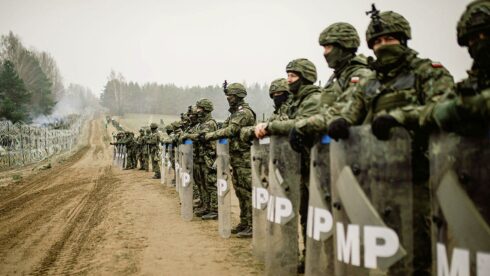Despite it, Lukashenko’s offer to act as a mediator in Ukrainian conflict should be taken seriously by Washington.
Written by Uriel Araujo, researcher with a focus on international and ethnic conflicts
The Polish authorities in Warsaw announced they have closed border checkpoints in Bobrowniki in response to the fact that a Minsk’s court sentenced a Polish activist to 8 years in jail over charges pertaining to inciting hate. The ruling took place after months of mass protests in Belarus, and Poland believes the sentence is politically motivated. Other checkpoints had already been closed over alleged security concerns. Minsk has described the Polish measures as “catastrophic”, claiming it could “lead to a collapse on both sides of the border”. It will increase the load on the remaining two checkpoints, where there already are very long lines.
I have written before on the very real migration crisis which Europe has been facing and on how the role Belarus plays on it is exaggerated to hypocritically demonize that state. There have been, in any case, a number of tragic deaths at the Poland-Belarus border in the context of such a crisis.
Two weeks ago, Polish authorities busted a criminal organization involved in a huge smuggling operation. This is a police matter, but, in the context of a political crisis, the fact can certainly be explored to add fuel to the fire.
The main border concern here however pertains to the conflict. Belarus forces are “ready to fulfill any tasks, including the most difficult ones if we have to”, according to Vadim Lukashevich, deputy commander of the Special Operations Forces of Belarus. Troops outside the city of Brest run drills lust week near the 38th Separate Guards Air Assault Brigade. These exercises took place 50 kilometers from Ukraine and just two miles (four kilometers) from the border with Poland, a EU and NATO member. Belarus has been hosting a number of Russian troops, but President Alexander Lukashenko has stated he will not send his own forces to Ukraine. It is estimated his country possesses about 70,000 troops.
Although some journalists often describe Belarus as a “Russian puppet state”, the truth is that both countries’ relationship is much more complex and nuanced. In any case, Minsk has historically cultivated close bilateral relations with Moscow. It stands in a complicated position, “sandwiched” between republics such as Latvia, Lithuania and Ukraine itself – all of them hostile to Russia and to itself. In July 2022 Lukashenko claimed Kiev had tried to attack his country, with the missiles supposedly launched having being neutralized just in time by his armed forces. Ukraine could in fact benefit from draggin Belarus into the conflict, in the hope that this would force a direct Western intervention – however, it could also backfire, with disastrous results, in case the West does not act as expected.
The conflict in Ukraine has been part of a Western proxy war against Russia and, in spite of historical Polish-Ukrainian disagreements (worsened by post-Maidan Ukrainian ultranationalism), Warsaw has been a strong supporter of Kiev against Moscow. Even before the current conflict, both neighboring nations actively opposed the Russian-German Nord Stream 2 project (which in fact could have avoided today’s energy crisis in Europe). Moreover, Poland has antagonized Germany over the same issue, while also pressuring Berlin to send tanks to Ukraine. This is part of Poland’s American-backed quest for regional leadership, as Washington seems to have become “fed up” with its German partner over the Nord Stream issue.
To make things more complicated, Poland and Ukraine are near a confederation, which can only increase even more the risk of bringing NATO’s direct involvement into the latter.
Although Minsk’s defensive exercises have been described by Western media as aggressive provocations, President Lukashenko has urged his American counterpart to go to Minsk, Belarus, in a joint meeting with himself and Russian President Vladimir Putin to “end the war”. It remains to be seen how long Belarus can manage to refrain from directly taking part into the current conflict, amid an escalation of tensions.
During Ukrainian President Volodymyr Zelensky’s visit to Washington in December 2022, he and Biden took part in a joint press conference. During it, Biden said more potent weapons will not be sent to Ukraine because it “would have a prospect of breaking up NATO”. In addition, the American leader remarked that his Atlantic allies are “not looking to go to war with Russia. They’re not looking for a third world war.”
Ukrainian and Western actions for the last couple of years have been characterized by dangerous moves (such as crossing red lines) and provocations. While the US profits in a number of ways from making the Ukrainian conflict perpetual and from the resulting European energy crisis, it has no intention to escalate things into a world war, as Biden aforementioned remarks make clear.
The problem with escalations of tensions, as I wrote before, is that they may have quite unintended and unpredictable consequences – and those in turn can always spiral out of control – as both world wars have taught us. Before reaching a point of no return, Washington should establish good diplomacy, exercise restraint and stop its dual containment policy, which dangerously aims at “containing” both Moscow and Beijing at the same time.
In light of that, Lukashenko’s invitation should be taken seriously. Unfortunately, there is no indication it will be.







The polish are as f’ked in the head as ukrainians.